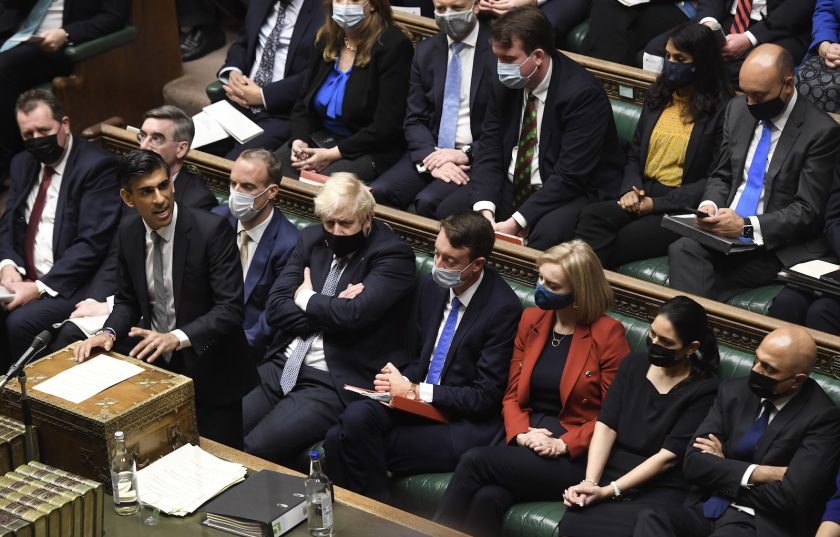Chancellor: ‘largest annual funding settlement to Wales since devolution’ – Welsh Government say ‘clear gaps in funding’

The Chancellor announced Barnett-based funding for the Welsh Government of £18 billion per year – that UK Government say is “delivering the largest annual funding settlement since devolution over 20 years ago” that includes a £2.5 billion per year “extra” as part of a Budget and Spending Review.
Although, Welsh Government Finance Minister Rebecca Evans said the UK government’s Spending Review and autumn Budget contained “clear gaps in funding where Westminster has failed to invest in Wales”.
Chancellor Rishi Sunak’s announcement that Wales will receive an average of £18 billion per year in Barnett-based funding represents a 2.6% rise in the Welsh Government’s budget each year. The UK Government noted “the Welsh Government will now receive around £120 per person for every £100 per person of equivalent UK Government spending in England”.
Chancellor of the Exchequer, Rishi Sunak said: “This is a budget for the whole of the UK. We’re focused on what matters most to the British people – the health of their loved ones, access to world-class public services, jobs for the future and tackling climate change.”
“An additional £2.5 billion per year in Barnett funding means the Welsh Government is well-funded to deliver all their devolved responsibilities while the people in Wales will also benefit from this Government’s commitment to levelling up opportunity and delivering for all parts of the UK.”
We are continuing to boost industry and jobs and improve infrastructure and public services throughout Wales.
Secretary of State for Wales, Simon Hart said: “This is a fantastic budget for Wales, delivering significant investment directly to people, businesses and communities across the country. The devolved administration in Wales will receive its largest-ever settlement so it can deliver its vital services like health, education and flood protection, while Wales will benefit fully from many of our UK-wide measures including freezes to fuel and alcohol duty, the increase in the minimum wage for thousands of workers and investment in parks and sports facilities.
“Levelling up communities across the UK is top of our agenda. Investing more than £120m in 10 projects including the regeneration of Aberystwyth seafront and improving transport links in Rhondda shows how we will achieve this ambition across Wales. Alongside the funding of a Welsh Veterans’ Commissioner, these measures and others in the Spending Review add up to an excellent package for Wales and its economy.”
The Welsh Government stressed that its own focus was now on “delivering a Welsh Government Budget in December that builds a stronger, greener, fairer Wales”.
The UK government’s Spending Review sets out its spending plans until 2024/25. On 20 December the Welsh Government will publish its Budget outlining its own spending plans over that period.
Rebecca Evans, the Welsh Government’s Finance Minister, said: “This UK government Spending Review hasn’t delivered for Wales. Vital funding priorities, such as the long-term remediation of coal tips and greater funding in rail infrastructure, have been ignored.
“While the Spending Review does give us some medium term financial certainty and some additional investment, it is more than offset by the inflationary and system pressures that we are facing. The budget fails to meet the scale of the challenge that families, public services and the wider economy are still facing as a result of the pandemic.
“The fact remains that there are clear gaps in funding where the UK government should be investing in Wales and it has chosen not to. Arrangements for replacing EU Structural Funds remain unclear but what we do know is it falls well short of the £375 million we were receiving – these are funds that support skills, businesses and decarbonisation. HS2 is expected to have a negative impact of £150 million per year on the Welsh economy, while the failure to back a long-term solution for Wales’ coal tips could create an additional financial pressure of at least £60 million per year.
“The limited measures announced by the Chancellor to help households grappling with the increase in the cost of living don’t go nearly far enough. Further steps should be taken to target support to lower income families struggling as a result of the cut to Universal Credit, the future increase in National Insurance contributions, and spiralling energy prices.
“While there can be no doubt that we have been left with some difficult choices I am determined to deliver a Budget that builds a stronger, greener, fairer Wales – helping public services and our economy recover from the pandemic, and moving us closer towards being a zero-carbon nation.
“In the run-up to the Spending Review the Welsh Government had strongly made the case for investment from the UK government in coal tip safety to tackle the impacts of climate change and support remediation in coal mining communities.”
Official HoC media image ©UK Parliament / Jessica Taylor
Spotted something? Got a story? Email: [email protected]
Latest News
